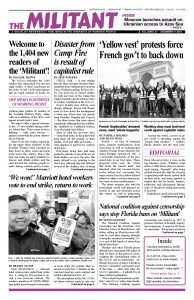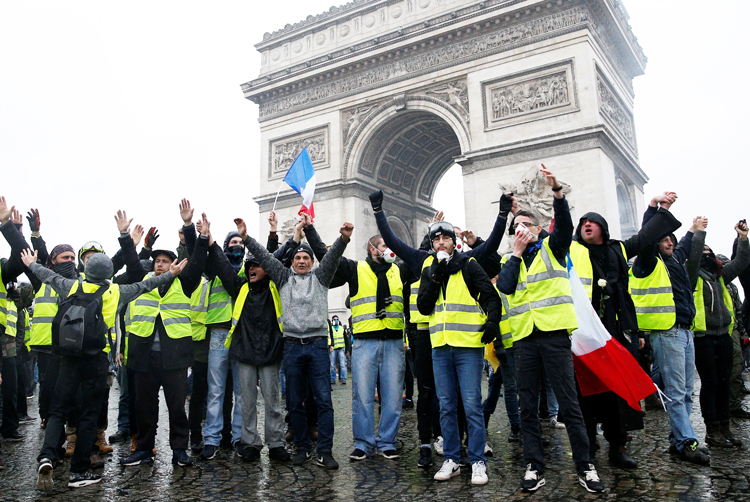PARIS — In face of sustained mass, popular mobilizations from rural areas as well as working-class suburbs, French Prime Minister Edouard Philippe announced Dec. 4 a six-month suspension of the proposed hike in car fuel taxes. These proposed taxes were the “straw that broke the camel’s back” and launched what has become known as the “yellow vest” movement. The name comes from the yellow-colored reflective safety vests the demonstrators wear on their mobilizations.
The prime minister also said the government would halt planned increases in gas and electricity prices this winter, as well as postponing tougher rules for vehicle emissions tests. The hikes were announced by President Emmanuel Macron to force people to drive less, supposedly to help control climate change.
Macron blinked one week after he vowed not to capitulate to the demands of the street. The yellow vests call former investment banker Macron “the president of the rich.”

From what these Communist League members from the U.K. witnessed on the Dec. 1 demonstration in Paris, it is by no means a given that the government’s concessions will be sufficient to stifle the protests. They are driven by the effects of today’s economic, political and cultural crisis of capitalism on the rural poor, and are supported by millions of working people throughout the country and beyond.
Yellow vest spokesman Benjamin Cauchy told Agence France-Presse that the movement wants the taxes cancelled — not postponed. “The French don’t want crumbs, they want a baguette [a whole loaf of bread],” he said. Many yellow vest protesters are now calling for wider changes, including higher pay and a rise in the minimum wage.
Decades of assaults on living standards
Anger at decades of assaults on living standards of working people, and the disdain of the political elite for their struggles, is what fuels yellow vest actions. They are very much a part of what Hillary Clinton in the U.S. dismissively called the “deplorables.”
“For us, every day is a battle to get by,” Tiphaine Galinet, a child care worker from Chartres, told us at the Dec. 1 protest. “We came today to show that ‘yellow vests’ are not vandals and to see for ourselves what it is really like on the streets.”
“I’ve never been in political demonstrations before,” Yoann Decoux, an out-of-work electrical lineman, told the New York Times, “but we said, enough is enough. They don’t even know how we get by with our tiny little salaries, but we are humans too, for God’s sake!”
“Either they reduce taxes or increase our wages,” Christopher, a 33-year-old worker in a perfume bottle factory from Picardie, in the north of France, told the Militant. “They should also stop the hikes in the costs of utilities and health insurance, but the government instead wants to stay on the topic of ‘ecology.’”
“It’s not that the environment isn’t important to us,” interrupted Ourilie, 34, an office worker with Christopher, “but taxing us isn’t the answer. I had to postpone the purchase of new glasses for my daughter, because it isn’t covered by the health insurance.”
In the countryside, people are dependent on their cars, Marco Pavan, a former taxi and truck driver in Besançon, told the Washington Post. “Ask a Parisian — for him none of this is an issue,” he said, referring to the fuel tax hikes, “because he doesn’t need a car. We live on the side of a mountain; there is no bus or train to take us anywhere. We have to have a car.”
Thousands came to Paris, the seat of power, because that’s also where the rich and the so-called enlightened meritocracy live and they wanted to be seen and heard. But the number was limited by the massive police presence, and marked by police attacks with tear gas and water cannons, as well as provocations by some on the far left and far right.
Some 75,000 people joined in largely peaceful protests and roadblocks across France. Some 1,500 marched in Limoges, many chanting, “Macron démission!” [Macron resign!] In an area known for its dairy production, one sign read, “Vache à lait — ras le bol.” (We’ve had enough of being cash cows.)
Over 1,000 marched in Lille. Trade unionists from the CGT trade union decided to join the march of the yellow vests. The same happened in Saint Nazaire. The national leadership of the CGT has opposed the yellow vest actions, saying they are influenced by ultrarightists.
It’s in the interest of the whole working class for the unions to join the yellow vests. As the crisis of capitalism continues to deepen, either the working class takes the lead in championing the rural toilers, or the fascists will.
And the protests haven’t stopped. On Dec. 3, high school students blocked more than 100 school gates across the country in support of the protests and against education ‘reforms’ the Macron government proposes. There were about 50 sizable roadblocks in southern France that day, Midi Libre reported.
Rejection of the government, parties
Many at the protest in Paris Dec. 1 expressed anger at all political parties, the government, the state and at the trade union officialdom. A 53-year-old woman named Natalie told us she was disgusted with all politicians, that none represent the people, that something new is needed. She voted for the leftist candidate Jean-Luc Mélenchon in the first round of the last presidential elections, and then for the National Front candidate Marine Le Pen in the run-off with Macron.
Another protester wrote “Frexit” on his vest, supporting British workers who voted for Brexit, and suggesting France should get out of the EU as well.
Nat London, Jacques Salfati and Erik Wils contributed to this article.


